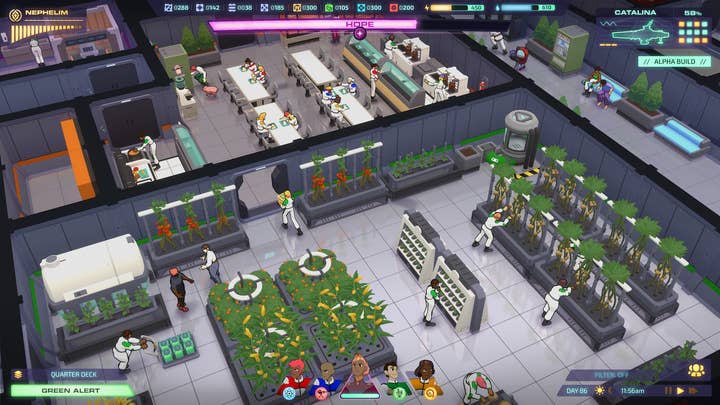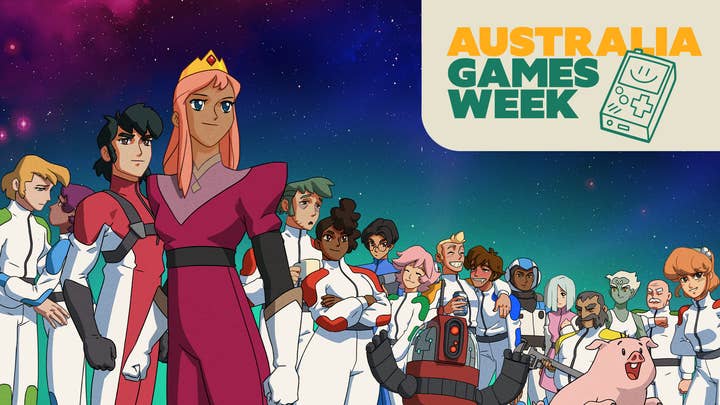League of Geeks: "It's a very serious time for a studio of our size"
Co-founder and studio director Trent Kusters talks resilience in the triple-I space, Jumplight Odyssey, and the evolution of the Early Access scene
League of Geeks has a special place in the Australian games industry. A pioneer of the indie scene with Armello back in the early 2010s, the Melbourne-based studio has followed a successful path for over a decade, always lending a helping hand to other Australian indies along the way.
"Our [aim] as a studio is to take strategy games and crack them open for wider audiences through a signature aesthetic, through subject matters that are cross-cultural and appeal to a far wider number of audiences than your typical hardcore fans [of the genre]," says studio director and co-founder Trent Kusters, who just won the Adam Lancman Award at the AGDAs, for his ongoing support to indies and being "a great ambassador for the Australian games industry locally and abroad."
"We are publishing and marketing in one of the busiest months I've ever seen in my life in games"
Kusters says League of Geeks wants to follow in Paradox's footsteps, making strategy games and their usually opaque UX "far more accessible."
The mission was more than successful with Armello, supported by the developer for four years after its 2015 release, and the developer is currently hard at work on its remake of cult classic Solium Infernum (due next year), and Jumplight Odyssey, a sci-fi sim with an anime aesthetic.
The latter released in Early Access on Steam this August. Kusters says the traction has been "amazing," with "wishlists in the six figures, up until [the] early access launch." Then things got a bit more difficult.
"The early access launch came out and we are publishing and marketing in one of the busiest months I've ever seen in my life in games. We punched into the top ten for a few hours there on Steam, and then we hovered around 15 or something for a couple of days. Unfortunately, the game had some bugs that slipped through that were a bit more prevalent than we thought. So, we cocked it in the Steam reviews, and rightly so, [because of] that.
"And also because we went so large... It's been a long time since we've been in early access, you know. We were one of the trailblazers of early access with Armello but the scene has changed a lot since."
Back in the early days of Steam's Early Access, the expectations were wildly different – the product could be very rough, whereas now "people are waiting until the games are almost finished," Kusters notes.
"I definitely think we underestimated just how much that had changed but then also, because our publishing and marketing efforts were so successful, we pulled in a much broader range of people than we probably should have for early access. Because we have people come to the game and be like, 'This game isn't finished'. And that's different from seasoned early access players saying, 'Oh this game is maybe a bit too early for early access' or whatever.
"I think honestly it was a bit of a bucket of cold water that the studio needed to be like, 'okay, shit, why did we miss those bugs? How do they sneak through?' The good news is all the issues that people mentioned were on our roadmap already and so we're fully aligned with the community and that stuff is being actively developed."
The team put together a "pretty aggressive patch schedule" and managed an impressive feat: turning the reviews around, from 'Mixed' at launch to 'Very positive' at the time of writing, for recent reviews.
Kusters says honesty with the community was at the core of the strategy for coming back from 'Mixed' territory, with the studio communicating regularly and even publishing a 'What we've learned in Early Access (so far)' post to share some lessons.
This also meant explaining where the company stood from a commercial perspective.
"We just straight up said to our community: we're an indie developer. This game had to go out in August because we have to think about the AAA release schedule and everything. We pushed the game out in August because we were like: that's our last chance to get out before all these planes are coming into landing and there's no room on the runway.
"But what we didn't realise is that we were already in the thick of the AAA madness. We thought we could slide between [Baldur's Gate 3] and Starfield and cut through some of the indie noise with our publishing efforts and marketing efforts. And we did it, we nailed it. But it was just still like... we may as well have released in November and take another two months to continue polishing the game."
Navigating the current challenges of the market can be an ordeal as an indie, and this year is a particularly tough one on many aspects. As mentioned by Kusters, first there's the crowded release slate. He mentions that's played a part in the demise of even successful indies, with German studio Mimimi Games shutting down earlier this year after the strong release of Shadow Gambit.
"It came out and it did great numbers but it dropped like a stone in the charts, like everyone else, a week after launch, because there's just the next game, and there's the next game, and the next game," Kusters says. "I'm hoping people will circle back to [Shadow Gambit] when all the awards come out. Mimimi closing down I'm sure wasn't a direct result of that, but they are smart enough to see that a game of [this] size needs to do particular numbers. As they said in their post, this isn't news to anyone, it's really, really tough to make video games in this climate as an independent studio with that many employees and in this sector of the industry, where you need a breakaway hit to essentially be sustainable."

Australia has so far otherwise been fairly sheltered from the recent wave of layoffs and closures, as we highlighted in our Australia Games Week articles. That's because of healthy support from governments both nationally and state-wide, and because the Australian games industry isn't "super entangled with these major Americans and European corporations," Kusters says.
"Looping back to all of the retrenchments and everything that's happening at the moment, I think a lot of that is coming because games get more and more expensive to make, from your little trash bag indies all the way through to your AAAA games. All of those segments in between, they're getting further and further apart. Armello cost $1.5 [million] to make, to get to launch – our new games are costing us about $8 million. Our games are four times more expensive, but we can't charge four times more. And that's happening across the board, and so studios and people fall through those cracks. And what the [Australian government] funding is hoping to do is help get people to move from one to the other."
League of Geeks is a 70-person strong studio now, working with a two-team system in what Kusters considers the "triple-I space."
"There are people out there, especially with the tax offset, that would give us money to just go to 250 people. But that's not what we want to do"
"There are people out there, especially with the tax offset, that would give us money to just go to 250 people," Kusters says. "But that's not what we want to do. I think the only way that we would scale from here is in response to success, [if] we had a game that went big that we needed to service. And we would do that very organically and conservatively – recent events would point to why we would do that."
He adds that he'd love to add a third team to the studio's setup. But caution is advised in today's climate.
"[We're thinking,] how many people can we actually have on a project when we've got contemporaries of ours deciding to close their studio when they've just released one of the best video games of the year? It's a very serious time for a studio of our size. That AA/triple-I [space], it's not the most resilient, or safe spot to be in.
"But the thing is, our teams are making great games and I feel that we, as a studio, understand how to straddle that line between being a creative studio and a commercial production house. What I'm getting at is, for League of Geeks, it's kind of rough seas ahead; I think for any commercial, creative, independent studio. PlayStation has pretty much stopped funding video games. Game Pass – they're picking winners. Tencent used to go around and do minority investing with whoever just happened to have a business card. But now they're being more selective about who they invest in. And it's meant that you need to sort of roll in these wins and hits a lot more often."
Kusters says League of Geeks has had acquisition offers in the past. And while the team is open to it, it'd need to be for "the right terms, the right number, and the right partner," which isn't a combination that has come along yet.
"We've actually had some great offers in 2021 that in hindsight maybe we should have taken but we were focused on making our game. We've learnt that lesson the hard way, and while we have all those chats and ensure that we've got our eyes on opportunities as they go past, we know not to try and catch a ride on everyone."

Kusters says that League of Geeks does benefit from a decade of experience and a unique identity that is well understood across the studio (and outside of it too).
"We've scaled to a point where we really have our processes refined. We know where we stand in the industry, who we are, and what we want to do, and actually our goal for me after these titles is to just release more and more games. We already know what the next two we're going to make are and we got games-as-a-service lifecycle planned on these two that we're working on now. At some point we'll exit, though – we probably won't over-invest like we did on Armello. But we're just keen to take this really talented team and keep developing their talent.
"We also have a responsibility because we are a home for talent here in Australia, and we're at a very critical step, we're an aspirational studio. We never planned to be or whatever, but the reality is that we are, in the Australian industry. I think we're the largest independent studio left that isn't on the ASX or has a parent company or a major investor or something like that. We're just really excited to sort of ensure that we can expand the opportunities within the team, on new titles and new experiences, and keep doing that, hopefully, in a sustainable way in this insane contraction."
Sign up for the GI Daily here to get the biggest news straight to your inbox



.jpg?width=291&height=164&fit=crop&quality=80&format=jpg&auto=webp)





